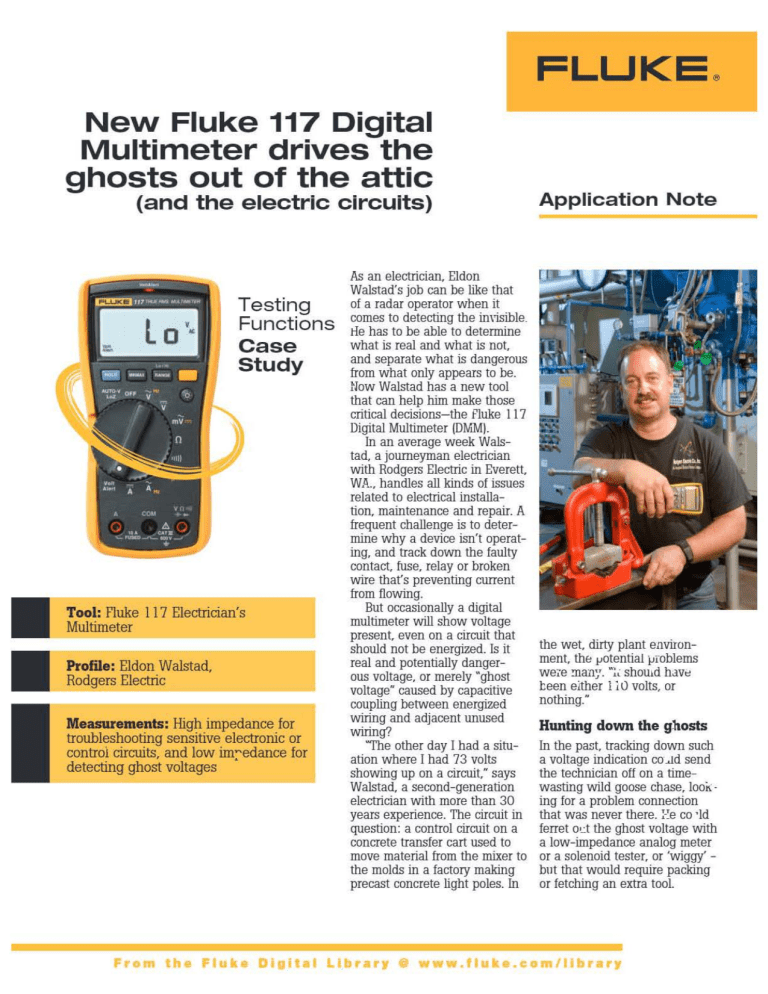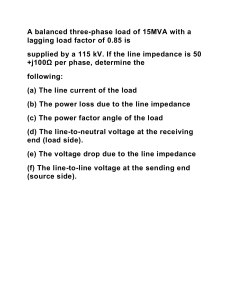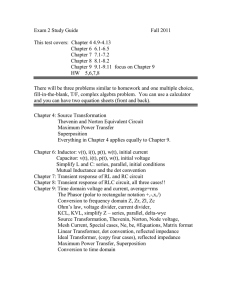
New Fluke 117 Digital Multimeter drives the ghosts out of the attic (and the electric circuits) Testing Functions Case Study Tool: Fluke 11 7 Electrician's Multimeter Profile: Eldon Walstad, Rodgers Electric Measurements: High impedance for troubleshooting sensitive electronic or control circuits, and low im:--edance for detecting ghost voltages As an electrician, Eldon Walstad's job can be like that of a radar operator when it comes to detecting the im'isible. tie has to be able to determine what is real and what is not, and separate what is dangerous from what only appears to be. Now Walstad has a new tool that can help him make those critical decisions-the fluke 117 Digital Multimeter (DMM). In an average week Walstad, a journeyman electrician with Rodgers Electric in Everett, WA., handles all kinds of issues related to electrical installation, maintenance and repair. A frequent challenge is to determine why a device isn't operating, and track down the faulty contact, fuse, relay or broken wire that's preventing current from flowing. But occasionally a digital multimeter will show voltage present, even on a circuit that should not be energized. Is it real and potentially dangerous voltage, or merely "ghost voltage" caused by capacitive coupling between energized wiring and adjacent unused wiring? 'The other day I had a situation where I had 73 volts showing up on a circuit," says Walstad, a second-generation electrician with more than 30 years experience. The circuit in question: a control circuit on a concrete transfer cart used to move material from the mixer to the molds in a factory making precast concrete light poles. In Application Note the wet, dirty plant environment, th& votential vroblems we-;e ~an~'- "~l shomd have been either 110 volts, or nothing." Hunting down the ghosts In the past, tracking down such a voltage indication co..Jd send the technician off on a timewasting wild goose chase, looi\ing for a problem connection that was never there. I-~e co · ld ferret o•..:.t the ghost voltage with a low-impedance analog meter or a solenoid tester, or 'wiggy' but that would require packing or fetching an extra tooL From the Fluke Digital Library 0 ww•.fll.lko.com/llbrarr FLUKE ® But Walstad had extra help. The Fluke 117 Digital Multimeter he was using that day has dual impedance capability; incorporating both regular high impedance test capabilities and low impedance functions for detecting ghost voltages. By switching to the meter's Auto-V/LoZ (low impedance) test setting, Walstad could see instantly that the 73 volts was only a ghost. "It saved me a trip back to the truck to get another meter," Walstad says. How impedance ai.iects testing Most digital multimeters for testing industrial, electrical and electronic systems have high impedance input circuits greater than 1 megohm. This means that when the DMM is placed across a circuit for a measurement, it will have little impact on circuit performance. This is the desired effect for most voltage measurement applications, and is especially important for sensitive electronics or control circuits. Ghost voltage ~an Older troubleshooting tools look real such as analog multimeters Ghost voltages are caused when and solenoid testers generenergized circuits and nonally have low impedance input energized wiring are located in circuitry around 10 kilohms or close pro-imity to each other, less. While these tools aren't such as in the same conduit or fooled by ghost voltages, they raceway. This condition forms a should only be used for testing capacitor and allows capacitive power circuits or other circuits coupling between the energized where the low impedance wiring and the adjacent unused will not negatively impact or wiring. alter circuit performance. They When you place your multirarely comply with the current meter leads between the open IEC 610 10 safety standards circuit and the neutral conduc- and North . .merican regulatory tor, you effectively complete requirements. the circuit through the input of the multimeter. The capacitance between the connected, hot conductor and the floating conductor forms a voltage divider in conjunction with the multimeter input impedance. The multimeter then measures and displays the resulting voltage value. Most digital multimeters today have an input impedance that's high enough to show this ghost voltage, giving a false impression of a live conductor. The meter is actually measuring voltage coupled into the disconnected conductor. But at times, these voltages can be 80-BS % of what the "hard" voltage should be. If not recognized as a ghost voltage, additional time, effort and money will be lost troubleshooting circuit problems. 2 Fluke Corporation New Fluke 117 Digital Multimeter drives the ghosts out o. :he atj c The best of both worlds With dual impedance meters, technicians can safely troubleshoot sensitive electronic or control circuits. as well as circuits that may contain ghost voltages, and can more reliably determine whether voltage is present on a circuit. On the Fluke 114, 116 and 117 DMMs, the meter's regular Vac and Vdc switch positions are high impedance. Use these switch positions for most troubleshooting scenarios and especially on sensitive electronic loads. The Fluke low impedance function is called Auto-V/LoZ. • Auto-V stands for automatic volts. This feature automatically determines whether the measured signal is ac voltage or de voltage, selects the correct function and range, and displays the correct information. • LoZ stands for Low Impedance (Z). This feature presents a low impedance input to the circuit under test. This reduces the possibility of false readings due to ghost voltages and improves accuracy when testing to determine absence or presence of voltage. FLUKE ® Use the Auto-V/LoZ switch Four user groups, position on the DMM when fou meters readings are suspect (ghost The new Fluke DMMs include voltages may be present) or four distinct models. each aimed when testing for the presence at a specific group of users. The of voltage. When the leads are 114 Electrical Multimeter is placed on an open circuit that for electrical troubleshootideal contains a ghost voltage, the and straightforward 'go/no ing low input impedance will cause go' testing in the residential the ghost voltage to dissipate and also is electrical setting, and the meter will display a designed for use in electric utilreacting near zero volts indicatity applications to test circuits ing no voltage present. When on before turning power back the leads are placed on a live at the meter. The 115 Multicircuit, however. the input meter is optimized for electrical senses the presence of "hard" and electronic testing by field voltage and then displays the service technicians. The 116 actual voltage present. Multimeter features temperature and microamps measurements Non-contact voltage useful for heating. ventilation, detection air conditioning and refrigeraThe Fluke 11 7 DMM also tion (HVAC/R) technicians. And includes the built-in VoltAlertn' the 117 Electrician's Multimenon-contact voltage functer tested by Eldon Walstad is designed for commercial electrition. Located on the top of the meter above the LCD display. cians. All are rated for use in 600 V CAT ill environments, it's another feature handy for and all except the 115 include detecting the invisible. The the LoZ low impedance test VoltAlert function detects the presence of ac voltage, sounds capability. an audible tone and activates "I like it," Walstad says of a red LED indicator light on the the 117. "When you're trying top center of the LCD display. to prove something, you've got Using this feature before to know whether you've got making a contact measurement real power there or not. If you can add an extra layer of safety. think you've got power but Users should. of course, still don't. then you can go off in a test for the presence of voltage different direction trying to find using test leads with the meter problems when you really need to be back here working on in the volts setting. something. You're not wandering aimlessly, looking for it." And there are no ghosts in sight. Fluke. Keeping your world up and running...... Fluke Corporation PO Box 9090. Everett. WAUSA 9820t Fluke Europe J.V. PO Box 1180. 51:02 BD Ei 1dboven. llle NetherL nds Fo more tnlormatlo'l can. In the U.S.A (800) 443-5853 or Fax (4251 446-5 116 In Europe1M EasttAlrica +3! (0)40 267:i 200 or Fax +3 1 (01 •10 267:i 222 In ~anada ~800)-36-FLUKE or Fax (905) 890-6866 From olber : oururies T I ' 425j 446 5500 or Fax +i (42'3) 446-5116 Weu aooess: http://WWW.fiuke.com c2006 n uke Corpo ation. All rtgbts reserved m 1J S.A 9/21 'lu :.:·4.00: A-EN-N Rev A Painted 3 Fluke Corporation New rtuke 117 Digital Mult1meter drives the gbosts out of the attic


